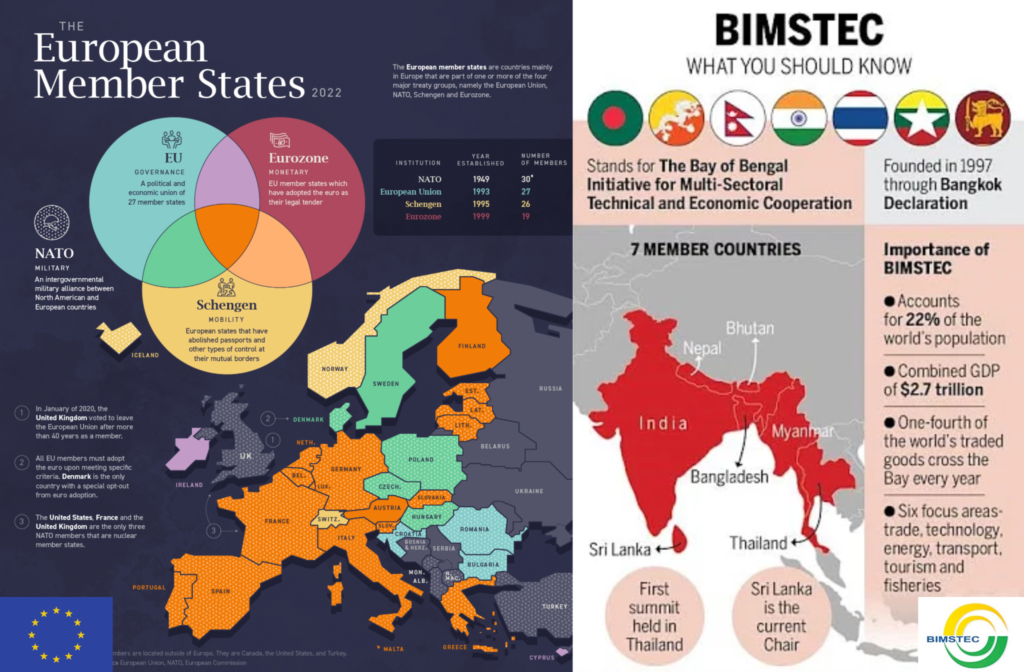Highlight 33/2023 – The EU as a resilient integrated economy in the 21st century: Lessons for BIMSTEC
Drorima Chatterjee, 1 November 2023

2) https://www.visualcapitalist.com/a-visual-guide-to-europes-member-states/
The European Union (EU) stands as an epitome of economic integration through regional governance, making it one of a kind through its various institutions and competencies. The EU’s role in the war in Ukraine and swift actions to replace Russian gas imports, which fell from 45% in 2021 to 22% in 2022, demonstrated itself as an adept regional governance structure. Despite its shortcomings in acting within EU Treaties and competencies, it also played a crucial role in the Greece debt crisis, collaborating with organizations like the European Central Bank (ECB) and the International Monetary Fund (IMF).
Parallels can be drawn here on how, like the EU, the Bay of Bengal Initiative for Multi-Sectoral Technical and Economic Cooperation (BIMSTEC) can enhance its role as a presiding body in the Sri Lankan economic crisis. However, despite Sri Lanka being a member, BIMSTEC has yet to make joint efforts to address the distress. Assistance was offered, but on an individual level, by the member states, such as a $500 million oil line of credit from India, along with $1 billion lines of credit for essentials. Bangladesh, too, extended the term of the loans. It helped the island nation pay off the entire amount in three instalments by September 2023.
Since its inception in 1997, BIMSTEC has aimed to promote economic cooperation between countries bordering the Bay of Bengal. By taking cues from the EU’s model of regional integration and collaboration, BIMSTEC can achieve its full potential as the member states would work together as a collective unit to oversee matters and implement crisis mechanisms. However, there are notable differences, such as their geographical positioning. The EU countries are closely knit and well connected through land.
The primary challenge BIMSTEC currently faces is the implementation of the Free Trade Agreement (FTA) introduced in 2004, which was even renewed in 2018. The low level of inter-regional trade suggests untapped potential for an FTA. Although the FTA includes provisions on dispute settlement, safeguard application, and customs matters, the trade negotiating committee has yet to reach a consensus on certain issues, resulting in a delay. BIMSTEC could use a visionary, like Robert Schuman was for the foundations of the EU, to push for a robust economic integration of the member countries.
The EU has faced its fair share of challenges in the 21st century but has shown remarkable resilience in adapting to them. On the other hand, BIMSTEC’s ability to mobilize resources has been impressive, with its 2012 remittances being comparable to those of the EU. Nevertheless, the EU can share its expertise on the Union Customs Code to accelerate customs operations and diversify its relations with the Indo-Pacific states through collaborations with BIMSTEC.
As a relatively young organization, BIMSTEC can learn from the EU’s political will to share sovereignty and foster an environment of trust and cooperation. With Thailand as the current chair, all eyes are on the Sixth BIMSTEC Summit scheduled for 30 November 2023, to analyse the decisions taken and pave the way for a promising future.
Drorima Chatterjee, Highlight 33/2023 – The EU as a resilient integrated economy in the 21st century: Lessons for BIMSTEC, 1 November 2023, available at www.meig.ch
The views expressed in the MEIG Highlights are personal to the authors and neither reflect the positions of the MEIG Programme nor those of the University of Geneva.
